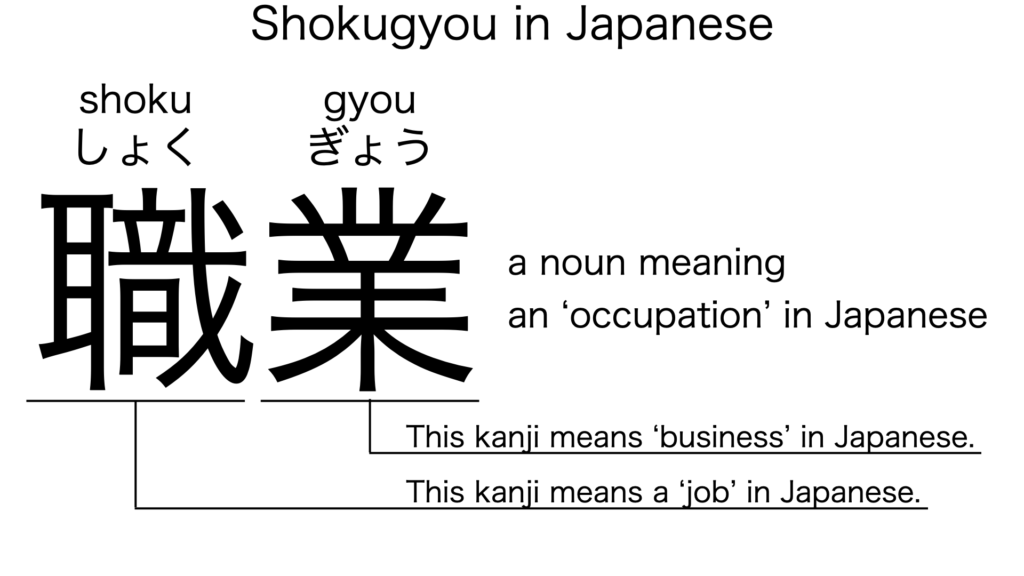What does “shokugyou” mean in Japanese?
Native speakers use shokugyou to mean an ‘occupation’ in Japanese. Perhaps, some Japanese learners know this word as it is sometimes used in Japanese conversations. In this blog post, however, I’m explaining this word in detail based on its kanji expression. And also, I’m explaining how to use it through example sentences. My explanations would help Japanese learners understand shokugyou more clearly. Then, let’s get started!
Contents
Definition and meanings of “shokugyou”
Let me start with the definition and meanings of shokugyou.
- shokugyou – 職業 (しょくぎょう) : a noun used to mean an ‘occupation’ in Japanese. This can also work as plural. Learn more about Japanese plural. Depending on the context and situation, this can also mean a ‘job’ in Japanese.
The definition and meanings are simple and clear. To understand this noun more clearly, however, let me explain its kanji characters in detail, one by one.
Shokugyou in kanji
The kanji expression of shokugyou consists of the following two kanji characters:
- 職 : a kanji character often used to mean a ‘job’ in Japanese.
- 業 : a kanji character often used to mean ‘business’ in Japanese.
From these two kanji characters, we can understand that shokugyou literally means a ‘job and business’ in Japanese. This literal interpretation is not completely in line with the actual meanings, but still very close, I think.

When we meet new kanji expressions, we should check their kanji characters in detail to understand their meanings clearly and deeply. In many cases, kanji characters tell us a lot about the meanings of the expressions they form. Actually, here, we could get the better understanding of shokugyou through the detailed kanji check above.
So far, I’ve explained the definition and meanings of shokugyou together with its kanji characters. Then, let me explain how to use it through the example sentences below.
How to say “occupation” in Japanese
kanojo no shokugyou wa sensei desu – 彼女の職業は先生です (かのじょのしょくぎょうはせんせいです)
Her occupation is a teacher.
Below are the new words used in the example sentence.
- kanojo – 彼女 (かのじょ) : a pronoun used to mean ‘she’ in Japanese.
- no – の : a case particle used after a noun or pronoun to make its possessive form. In the example, this is used after kanojo to make its possessive form, kanojo no, which means ‘her’ in Japanese.
- wa – は : a binding particle working as a case marker or topic marker. In the example, this works after kanojo no shokugyou to make the subject in the sentence.
- sensei – 先生 (せんせい) : a noun used to mean a ‘teacher’ in Japanese. This can also work as plural.
- desu – です : an auxiliary verb used after a noun or adjective to make it polite. Probably, this is well known as a part of the Japanese desu form. In the example, this is used after sensei to make it sound polite.
This is a typical usage of shokugyou. In this example, it works together with kanojo and no to mean ‘her occupation’ in Japanese.
Another example of “shokugyou”
kono shokugyou wa boku ni au to omou – この職業は僕に合うと思う (このしょくぎょうはぼくにあうとおもう)
This job suits me, I think.
Below are the new words used in the example sentence.
- kono – この : a determiner used before a noun which refers to something close to the speaker. In the example, this is used before shokugyou to mean ‘this occupation’ in Japanese.
- boku – 僕 (ぼく) : a pronoun used to mean ‘I’ in Japanese. This is used mainly by boys and young males.
- ni – に : a case particle used to say in which direction an action goes. In the example, this is used after boku to say whom the job suits.
- au – 合う (あう) : a verb used to mean ‘to suit’, ‘to fit’, or such in Japanese.
- to – と : a case particle used as a quote marker. In the example, this is used after kono shokugyou wa boku ni au to say what the speaker thinks.
- omou – 思う (おもう) : a verb often used to mean ‘to think’ in Japanese.
This is another example of shokugyou. In this example, it works together with the determiner, kono, to mean ‘this job’ in Japanese. When we want to mean an ‘occupation’ or ‘job’ in Japanese, anyway, this noun is a very good option.
Summary
In this blog post, I’ve explained the definition and meanings of shokugyou in detail based on its kanji expression. And also, I’ve explained how to use it through the example sentences. Let me summarize them as follows.
- shokugyou – 職業 (しょくぎょう) : a noun used to mean an ‘occupation’ in Japanese. This can also work as plural. Depending on the context and situation, this can also mean a ‘job’ in Japanese. These two kanji characters literally mean a ‘job and business’ in Japanese. This literal interpretation is not completely in line with the actual meanings, but still very close, I think.
Hope my explanations are understandable and helpful for Japanese learners.
Leave a Reply